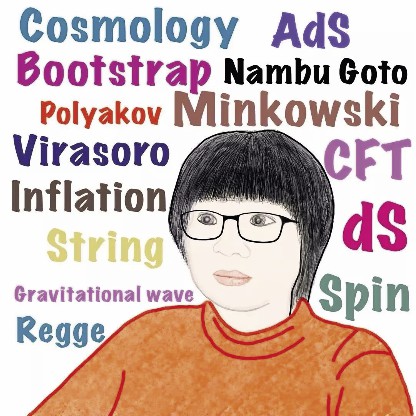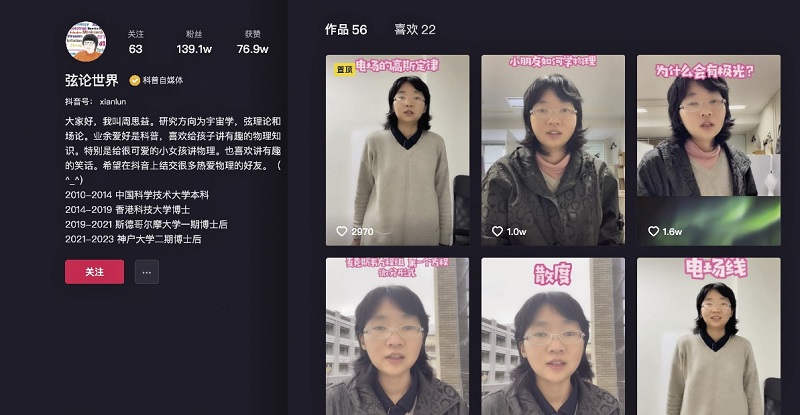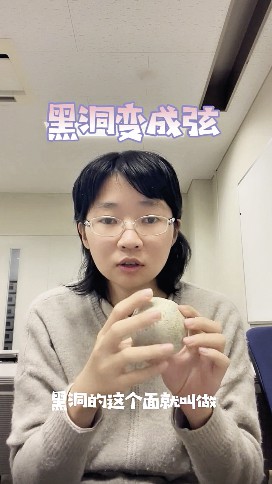Award-winning young scientist becomes voice of science on social media.

Zhou Siyi cuts a striking figure. Or to be precise, her avatar on Douyin does. On the video-centric social networking platform, known as TikTok outside China, the 29-year-old Zhou, is a physics wiz in black glasses and a fluorescent orange tee, surrounded by a cloud of words related to cosmology, the string theory, field theory, and other cutting-edge branches of modern physics.
“These are the keywords of my research area,” said Zhou, describing her recent foray into Douyin. For about four months, she has been posting videos on the app to explain science to laypeople. She breaks down long and mysterious scientific terms into straightforward everyday language so that everyone can get a little glimpse into the deepest enigmas of the universe. Her account, Xianlun Shijie (World of String Theory), has already acquired 245,000 followers from various professions and her work is gaining recognition, with hundreds of thousands liking her posts.
“Recently many little buddies asked me, do UFOs exist?” she said in a childlike drawl, the way a “little buddy” might have asked the question. That is her style. She calls herself “teacher” and her followers her “little buddies.” They include researchers, Ph.D. students and high school students discussing quantum physics, black holes, or dark matter, and Zhou is ambitious on their behalf: “No one should be too surprised if one or two Nobel laureates pop out from them.”

A List of short videos Zhou has released on her main page.
World of Laughter & Tears
As a child, Zhou’s toys were circuit boards. Her grandfather taught physics in a high school and her father, with a degree in mechanical automation, runs an automation company. “They showed me all kinds of circuit boards since I was a kid,” she said. She learned the working mechanism of pinhole photography from her grandfather when she was in kindergarten, and when she was in primary school, the two would make gadgets together, such as radios and model aeroplanes. Once Zhou invented a device to squeeze out the remaining toothpaste in a tube. The two of them, after making the device, applied for a patent on it.
Physics has brought Zhou the enjoyment of solving problems with her hands and brain. It has also given her an inner eye with which she can understand the logic behind many scientific phenomena, and that makes her euphoric.
In junior high school, Zhou’s gift in physics bloomed. She could always provide the right answer to any question in her physics lessons. In her senior high school, she attended a school where the best students in the city went, but Zhou still managed to stand out.
Then she watched a documentary, Dimensions: A Walk through Mathematics, that guided viewers through elementary math to the complexities of the fourth dimension. The two-hour documentary gave Zhou her first glimpse of the beauty of science in its purest form, she said.
“The beauty lies in the visualization. Once it is visualized, something that had been nebulous in your mind gets clarified. It’s like going to the police station to file a complaint and they ask you to describe the suspect. You start providing little details, like what their eyes looked like, the glasses the person wore, and other stuff, and the police start making an identikit. Like someone said, when a concept of physics is turned into a full-dimensional picture, it is touchingly beautiful because it contains the infinite truth of the cosmos.”
“Girls Aren’t Meant to Be Scientists”
As a child, Zhou would often hear, “Girls aren’t meant to be scientists.” She called it a prevailing prejudice in Asia against women who study science. So, her Douyin account emphasizes that she likes “sharing interesting information about science with children, especially little girls.”
While doing her Ph.D. at the Hong Kong University of Science and Technology, she got the chance to talk to Argentinian physicist Juan Martin Maldacena. Those two hours, she said, were worth more than a whole year’s hard work.
In 2020, Zhou’s thesis, which she co-authored with Suro Kim, Toshifumi Noumi, and Keito Takeuchi, was awarded the Particle Physics Medal in the Young Scientist Award instituted by the Physical Society of Japan.
A year later, Zhou watched a short video by Dr. Yuan Lanfeng, a researcher at the China Science and Technology University, who also hosts the program Yuan’s Multiverse on YouTube to share scientific knowledge with the public.
Yuan’s work inspired Zhou to do something similar to dispel ignorance about science. Subsequently, she posted her first video on Douyin in July 2021, sharing information about the merger of black holes and neutron stars and explaining why the academia was so excited about the news.

Zhou discusses the black hole and string theory in one of her short clips.
Infusing Fresh Blood in Chinese Research
On her Douyin account, Zhou keeps sharing on an eclectic mix of subjects to keep viewers engrossed, such as “how is energy stolen from black holes?” “Do Trisolarans really exist?” (which is a reference to Trisolaris, an imaginary planet in a harsh and doomed solar system conceived by eminent Chinese author-scientist Liu Cixin in his award-winning science fiction trilogy Three-Body Problem), and even “How does a kindergarten pupil do her hair?”
For some viewers, on whose pages Zhou’s posts appear unsought due to algorithm, the videos can be challenging, such as the one on how to explain to a primary school student the concept of PV diagram phase change, the graph showing the states of a substance under different conditions of temperature and pressure.
“These videos are far beyond my humble understanding!” One viewer commented. But some feel complimented. Though first introduced to her posts by a mechanical arrangement, many have chosen to follow her.
“What she talks about is beyond me, but attracts me all the same,” said a housewife whose child is a junior high school student. They are both fans of Zhou’s videos and say although they can’t always comprehend what she is saying, they still cannot stop watching. As a result, Zhou’s account has become a classroom for those who want to understand science.
To her surprise and gratification, some of her followers have reorganized her topics in a more layman-friendly language and uploaded the short video clips online. “I saw myself as the teacher to my little buddies,” she said, impressed. “It turned out that I also have many teachers among them!”
To satisfy her audience’s desire to understand science better, Zhou requests experts from various professions to share their expertise, and her account offers her followers the opportunity to communicate with researchers and professors.
Zhou lauds the power of short video platforms, which she thinks reach out to a much wider audience than traditional media. With the help of such platforms, more young people can understand science, she said. And there will be more fresh blood in China’s science research forces.
LIU YAN is a reporter of Science Daily.